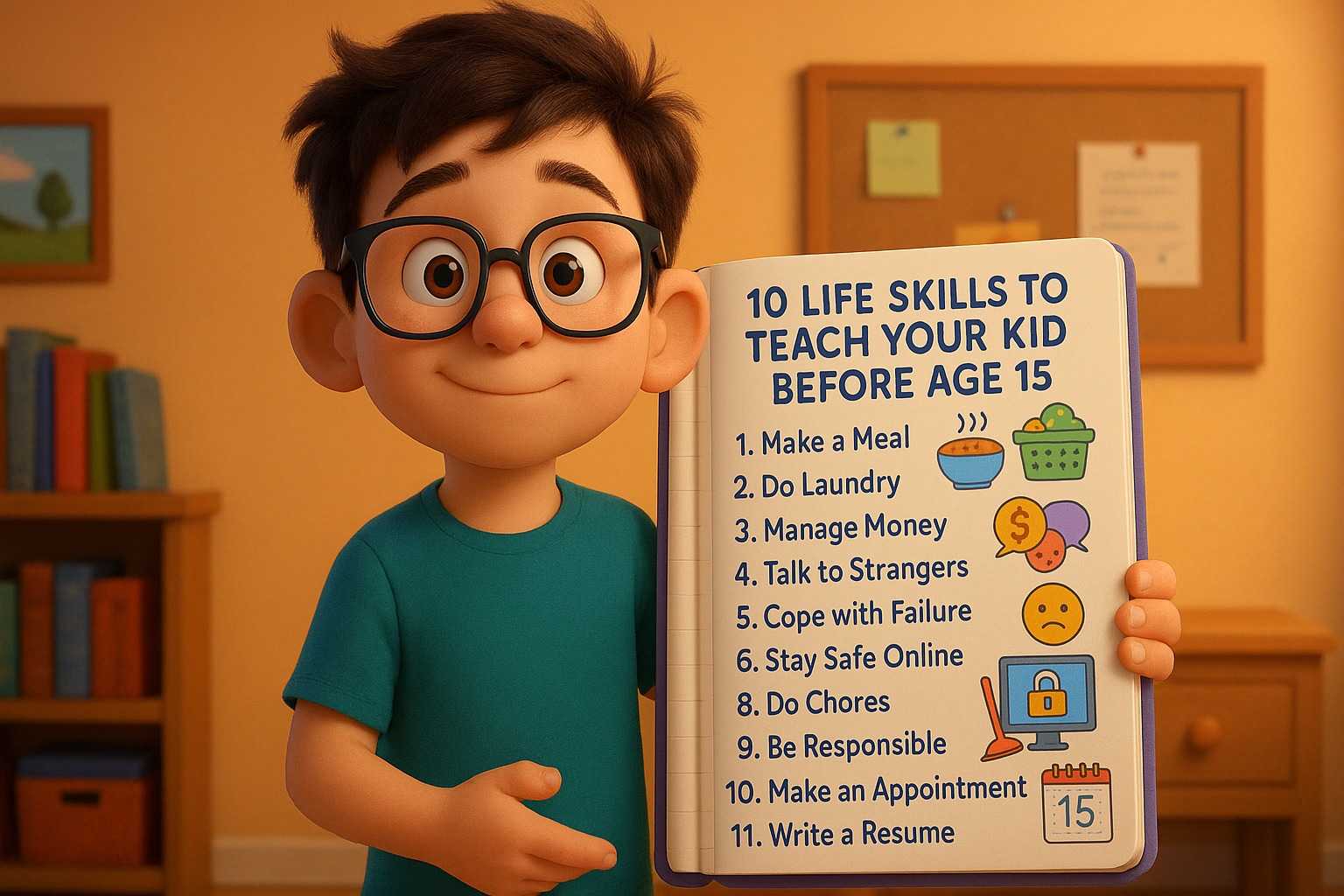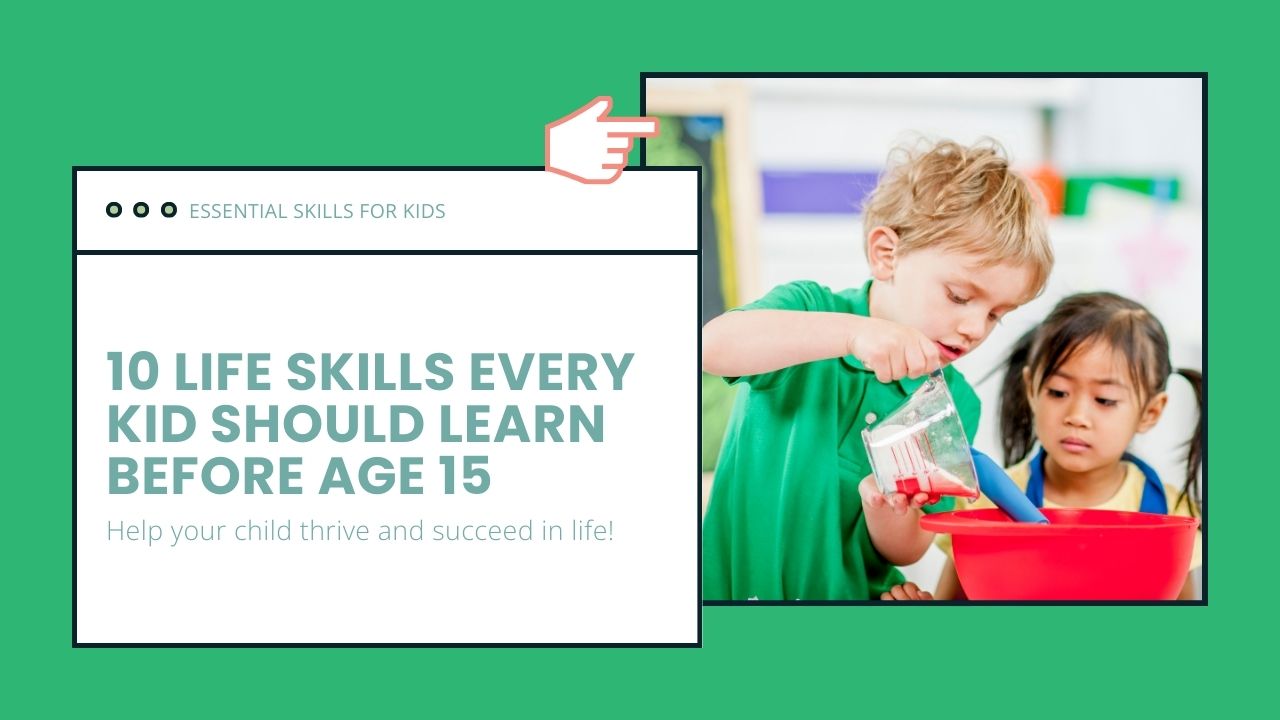Loading advertisement...
17-04-2025

As parents, we dream of raising kids who are confident, capable, and kind. But academic success alone isn’t enough — life demands so much more. That's why teaching key life skills early is crucial. Between ages 10 to 15, kids are developing independence and identity, making it the perfect time to equip them with practical tools for the real world.
Here are 10 essential life skills to focus on — and tips on how you can teach them naturally in your everyday life.
Knowing how to cook simple meals gives kids a huge confidence boost. Start with easy tasks like making sandwiches, smoothies, or boiling pasta. As they grow more comfortable, move to chopping vegetables safely, following recipes, and understanding kitchen safety (like handling knives or hot stoves).
👉 Tip: Plan a “kids cook dinner” night once a week!
Understanding the value of money is critical. Teach your kids about saving, spending wisely, and even setting financial goals. Open a small savings account for them or use a piggy bank system for younger kids.
👉 Example: Give them a budget for a school shopping trip and let them manage it.
Juggling school, hobbies, chores, and downtime can be overwhelming. Teach them how to make schedules, prioritize tasks, and stick to a routine. Time management now builds discipline for later academic and career success.
👉 Activity: Sit together every Sunday and plan the week ahead using a simple planner or app.
No one wants their teenager heading off to college without knowing how to do laundry! Teach sorting clothes, reading care labels, operating washing machines, and basic mending (like sewing a button).
👉 Challenge: Have them do their laundry one weekend — start to finish.
Good communication is a life superpower. Help them practice clear speaking, active listening, and polite interaction — with adults, peers, and even in tricky situations like handling disagreements.
👉 Practice: Role-play scenarios like returning an item at a store or apologizing after a misunderstanding.

Instead of rushing to fix every issue for them, guide kids through finding their own solutions. Ask guiding questions like, “What are some ways we could solve this?” or “What do you think we should try first?”
👉 Real life example: Let them figure out how to organize a messy room or fix a missing homework assignment issue.
Accidents happen. Teach your kids basic first aid — how to treat minor cuts, sprains, burns, and when to seek help. Also, they should know important emergency contacts and how to call for help if needed.
👉 Fun idea: Take a basic first aid course together through Red Cross or a community center.
Skills like cleaning, organizing, changing a light bulb, or unclogging a sink are basic but empowering. Involve them in routine chores, not as punishment, but as a family responsibility.
👉 Motivation tip: Rotate "home manager" roles weekly — where they are in charge of small chores or projects.
Teach kids how to be aware of their surroundings, say no assertively, and trust their instincts. Basic self-defense classes teach not only moves but also confidence and safety awareness.
👉 Safety talk: Discuss everyday safety topics openly, like how to stay safe when walking home alone or using public transportation.
Emotional skills — recognizing feelings, handling anger, showing empathy — are as critical as academic achievements. Encourage open conversations about emotions, model calm conflict resolution, and teach that mistakes are part of learning.
👉 Daily check-in: Ask, “How are you feeling today?” instead of just “How was your day?”
Critical Thinking: Encourage curiosity and questioning.
Respect for Diversity: Teach them to embrace differences in people.
Digital Literacy: Safe and smart use of internet and technology.
Gratitude Practice: Building a mindset of appreciation.
Goal Setting: Teach them to dream, plan, and work steadily toward goals.
Teaching life skills isn’t about making kids "grow up fast" — it’s about giving them the tools to feel empowered, prepared, and confident. Every small lesson you teach now plants a seed for their future independence and happiness.
Remember: progress over perfection. Let them make mistakes, try again, and learn with your gentle guidance. You’re not just raising a child — you’re raising a future adult who will someday thank you for every life skill you gave them.
For More Updates,join us and stay connected!